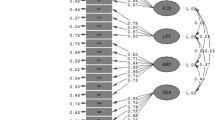Abstract
The present study aims to examine the mediating role of mindfulness in the relationship between the cognitive flexibility and irrational performance beliefs of university student-athletes. 142 student-athletes from Gazi University Faculty of Sports Sciences were included in the study. The Mindfulness Inventory for Sport, the Irrational Performance Beliefs Inventory-2 and the Cognitive Flexibility Inventory were used as data collection tools. SPSS 25 was used to examine the relationship between descriptive statistics and variables. CFA, SEM and Bootstrap tests were carried out through AMOS 24. In conclusion, it was observed that non-judgment, which is a sub-dimension of mindfulness, had a partial mediating effect on the relationship between cognitive flexibility and irrational performance beliefs.

Similar content being viewed by others
References
Baltzell, A., & Summers, J. (2018). The power of mindfulness: Mindfulness meditation training in sport (MMTS). Cham: Springer. https://doi.org/10.1007/978-3-319-70410-4.
Baron, R. M., & Kenny, D. A. (1986). The moderator-mediator variable distinction in social psychological research: Conceptual, strategic, and statistical considerations. Journal of Personality and Social Psychology, 51(6), 1173–1182 Retrieved from https://psycnet.apa.org/buy/1987-13085-001.
Butler, A. (2018). Meditation, mindfulness, and cognitive flexibility. Departmental Honors Thesis, Ball State University, Muncie.
Dennis, J. P., & Vander Wal, J. S. (2010). The cognitive flexibility inventory: Instrument development and estimates of reliability and validity. Cognitive Therapy and Research, 34(3), 241–253. https://doi.org/10.1007/s10608-009-9276-4.
Dryden, W., David, D., & Ellis, A. (2010). Rational emotive behavior therapy. In D. Dobson (Ed.), Handbook of cognitive behavioral therapies (pp. 226–276). New York: The Guilford Press.
Ellis, A., & Dryden, W. (2007). The practice of rational emotive behavior therapy. New York, NY: Springer.
Ellis, A., David, D., & Lynn, S. J. (2010). Rational and irrational beliefs: Research, theory, and clinical practice. In D. David, S. J. Lynn, & A. Ellis (Eds.), Rational and irrational beliefs: A historical and conceptual perspective (pp. 3–22). New York: Oxford University Press.
Fairchild, A. J., MacKinnon, D. P., Taborga, M. P., & Taylor, A. B. (2009). R2 effect-size measures for mediation analysis. Behavior Research Methods, 41(2), 486–498. https://doi.org/10.3758/BRM.41.2.486
Forza, C., & Filippini, R. (1998). TQM impact on quality conformance and customer satisfaction: a causal model. International Journal of Production Economics, 55(1), 1–20. https://doi.org/10.1016/S0925-5273(98)00007-3.
Frewen, P. A., Evans, E. M., Maraj, N., Dozois, D. J., & Partridge, K. (2008). Letting go: Mindfulness and negative automatic thinking. Cognitive Therapy and Research, 32(6), 758–774. https://doi.org/10.1007/s10608-007-9142-1.
George, D. & Mallery, M. (2020). IBM SPSS statistics 23 step by step: A simple guide and reference. Routledge.
Gülüm, İ. V., & Dağ, İ. (2012). The Turkish adaptation, validity, and reliability study of the Repetitive Thinking Questionnaire and the Cognitive Flexibility Inventory. Anatolian Journal of Psychiatry, 13(3), 216–223. Retrieved from https://toad.halileksi.net/sites/default/files/pdf/tekrarlayici-dusunme-olcegi-toad.pdf.
Kabat-Zinn, J. (2012). Mindfulness for beginners: Reclaiming the present moment and your life. Boulder: Sounds True.
Kabat-Zinn, J. (2015). Mindfulness. Mindfulness., 6(6), 1481–1483. https://doi.org/10.1007/s12671-015-0456-x.
Moore, B. A. (2013). Propensity for experiencing flow: The roles of cognitive flexibility and mindfulness. The Humanistic Psychologist, 41(4), 319–332. https://doi.org/10.1080/08873267.2013.820954.
Moore, A., & Malinowski, P. (2009). Meditation, mindfulness and cognitive flexibility. Consciousness and Cognition, 18(1), 176–186. https://doi.org/10.1016/j.concog.2008.12.008.
Preacher, K. J., & Hayes, A. F. (2008). Asymptotic and resampling strategies for assessing and comparing indirect effects in multiple mediator models. Behavior Research Methods, 40(3), 879–891. https://doi.org/10.3758/BRM.40.3.879.
Ruscio, J. (2010). Irrational beliefs stemming from judgment errors: Cognitive limitations, biases, and experiential learning. In David, D., Lynn, S. J., & Ellis, A. (Eds.), Rational and irrational beliefs: A historical and conceptual perspective (pp. 291–312). New York: Oxford University Press.
Schermelleh-Engel, K., Moosbrugger, H., & Müller, H. (2003). Evaluating the fit of structural equation models: Tests of significance and descriptive goodness-of-fit measures. Methods of Psychological Research Online, 8(2), 23–74 Retrieved from http://www.mpr-online.de/.
Thienot, E., Jackson, B., Dimmock, J., Grove, J. R., Bernier, M., & Fournier, J. F. (2014). Development and preliminary validation of the mindfulness inventory for sport. Psychology of Sport and Exercise, 15(1), 72–80. https://doi.org/10.1016/j.psychsport.2013.10.003.
Tingaz, E. O. (2020). Adaptation of the Mindfulness Inventory for Sport into Turkish: A Validity and Reliability Study. Spormetre The Journal of Physical Education and Sport Sciences, 18(1), 71–80.
Turner, M. J. (2016). Rational emotive behavior therapy (REBT), irrational and rational beliefs, and the mental health of athletes. Frontiers in Psychology, 7, 1423. https://doi.org/10.3389/fpsyg.2016.01423.
Turner, M. J., & Allen, M. S. (2018). Confirmatory factor analysis of the irrational performance beliefs inventory (iPBI) in a sample of amateur and semi-professional athletes. Psychology of Sport and Exercise, 35, 126–130.
Urfa, O., & Aşçı, F. H. (2018). Examination of psychometric properties of the irrational performance belief Inventory-2. Studies in Psychology, 38(2), 219–236. https://doi.org/10.26650/SP2018-0004.
Yu, C. Y. (2002). Evaluating cutoff criteria of model fit indices for latent variable models with binary and continuous outcomes. Doctoral Dissertation. Los Angeles: University of California.
Author information
Authors and Affiliations
Corresponding author
Ethics declarations
Conflict of Interest
The author declare that he has no conflict of interest.
Ethical Approval
The study protocol was approved by the ethics committee of Gazi University, Ankara, (Approval no. 2020–086).
Informed Consent
Informed consent was given to all participants in order to get their allowance for this study.
Additional information
Publisher’s Note
Springer Nature remains neutral with regard to jurisdictional claims in published maps and institutional affiliations.
The study protocol was approved by the ethics committee of Gazi University, Ankara, (Approval no. 2020-086).
Rights and permissions
About this article
Cite this article
Tingaz, E.O. The mediating role of mindfulness in the relationship between the cognitive flexibility and irrational performance beliefs of university student-athletes. Curr Psychol 39, 1208–1214 (2020). https://doi.org/10.1007/s12144-020-00891-1
Published:
Issue Date:
DOI: https://doi.org/10.1007/s12144-020-00891-1




